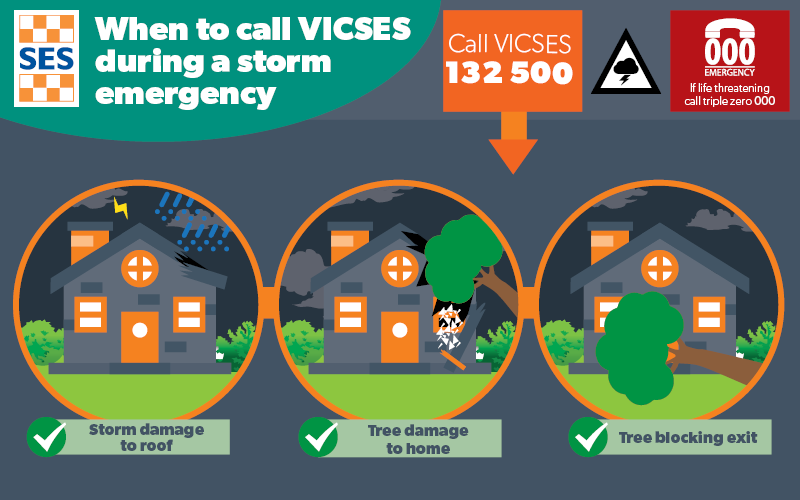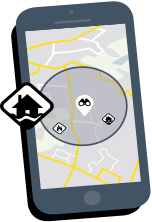There are a number of things that you can do to make sure you and your property stay safe during storms. Remember, for storm emergency assistance from VICSES call 132 500. For life-threatening emergencies call triple-zero (000).
Be Storm Smart
Every year, VICSES responds to thousands of storm-related emergency calls for assistance.
Storms can bring down trees, branches, and power lines, damaging property, vehicles and impacting access.
It’s crucial to understand the risks of a storm and take simple steps to protect your property to ensure your safety. Preparing early is your best defence against storms – follow these quick tips:
- Trim back trees and branches away from your home.
- Park your car under cover or away from trees.
- Keep gutters, downpipes and drains clear of debris.
- Secure outdoor furniture and trampolines.
- Prepare your emergency kit.
- Check your home insurance is up to date.
Check out our Be Storm Smart online interactive page for more information.
Are you storm ready?
It might be one day, one week, or one month away. But a storm will come. The best thing you can do to protect yourself and your property is to prepare for the worst.
Here are some easy tips to increase the safety of your property before a storm hits:
-
Keep trees and branches away from your home.
-
Park your car undercover.
-
Keep gutters, downpipes and drains clean.
-
Secure outdoor furniture and trampolines.
-
Prepare an emergency kit with essential items.
For more information, please visit: Are you storm ready?
How to plan and stay safe before a storm hits
Storms can occur anywhere and at any time. They often bring strong winds, flash flooding, large hailstones and lightning. They can cause major damage and put your life at risk.
VICSES respond to around 20,000 requests for assistance as a result of storms each year, which equates to approx. 80% of all requests for assistance. Much of the damage has been the result of tree branches, trampolines, outdoor furniture or other loose items such as roof tiles becoming flying projectiles in strong winds, flooding due to blocked drains, cars damaged while parked under trees and falling overhanging branches.
It's important to be aware of the dangers of severe weather and learn some simple, useful ways you can take responsibility for your own safety and that of your property, particularly for those incidents that can be prevented. It is very difficult to forecast exactly where a storm will affect an area, and what sort of damage will be done. Early preparation is the best defence against storms.
Take the time to prepare and know what to do before, during and after a storm with the VICSES emergency preparedness booklet for flood and storm.
Here's what you can do to plan and stay safe before a storm hits:
-
Plan for what you will do and take with you, if you need to evacuate. Find out how to prepare your home and/or workplace, and consider the advice below.
-
Before a storm hits:
-
Park your car undercover and away from trees.
-
Clean your gutters, downpipes and drains to ensure they are not blocked.
-
Check that loose items such as outdoor furniture, umbrellas and trampolines are safely secured.
-
-
Be alert to dangerous road conditions when driving, including low visibility, fallen and damaged trees and powerlines. Avoid travel if possible.
-
Be prepared - You may be isolated for an extended period of time. Make sure you have essential supplies prepared to last for at least three to five days, including food, drinking water, medications and pet food.
-
Be prepared - You may lose services including power, water, sewerage and gas.
-
Stay informed – monitor weather warnings and forecasts at the Bureau of Meteorology website, and warnings through the VicEmergency app, website and hotline (1800 226 226).
Going camping?
Learn more about how to plan for emergencies when on holiday here.
What to do during a storm
VICSES are the control agency for storms. In the event of a storm, know when you can call 132 500 for help:

Ensure you do the following during a storm to protect yourself, your family and your property:
-
Stay indoors and away from windows.
-
Look out for and avoid:
-
Falling or damaged trees.
-
Damaged roads and debris.
-
Fallen powerlines - Always assume that they are live.
-
-
If outdoors, move to a safe place indoors. Stay away from trees, drains, gutters, creeks and waterways.
-
Be aware of hazardous trees - heat, fire or recent storms may make trees unstable and more likely to fall during a storm.
-
If driving conditions are dangerous, safely pull over away from trees, drains, low-lying areas and floodwater:
-
Watch out for damaged or affected roads and hazards after storms or flash flooding.
-
Driving hazards could include mud, debris, landslides, fallen and damaged trees and damaged bitumen.
-
Drive to the conditions and find an alternative travel route if roads are impacted.
-
-
Avoid travel if possible.
-
If it is unsafe to leave during a storm, you may become isolated. Make sure you have essential supplies to last for at least three to five days, including food, drinking water, medications and pet food.
During a storm, it is important to stay informed. Monitor weather warnings and forecasts at the Bureau of Meteorology website, and warnings through the VicEmergency app, website and hotline (1800 226 226) and by listening to emergency broadcasters such as ABC local radio, designated commercial radio and TV news stations.
Recovery after a storm
After a storm, ensure that you and your family, friends and property are safe, and seek help if you need it.
-
Check your home and property for damage.
-
Stay safe by avoiding dangerous hazards, such as floodwater, mud, debris, damaged roads and fallen or damaged trees.
-
Stay away from fallen powerlines – always assume they are live.
-
Drive slowly, obey all road signs and never drive through floodwater.
-
Call 132 500 for emergency assistance from VICSES in the event of flooding.
-
Call Triple Zero (000) in life threatening emergencies.
-
When cleaning up after a storm, consider your health and safety.
-
Do not enter damaged or flooded buildings until authorities advise it is safe to do so.
-
Wear strong boots, gloves and protective clothing while cleaning up.
-
Wash your hands and clothes regularly.
-
-
Remember that electricity, gas and water supplies may be disrupted. If your property has been damaged, have all utilities checked and tested by a licenced technician before you use them.
-
If there are fallen powerlines, keep away. Always assume fallen powerlines are live. Standing near fallen powerlines can be fatal. Stay well clear – more than 8-10 metres away. Contact your local power company: esv.vic.gov.au/safety-education/emergencies/electrical-emergency/
-
Call your insurance company to organise any insurance matters, and remember to take photos of damage.
Additional support is available for you as you recover. Head to our 'recovery after an emergency' page for more information.







